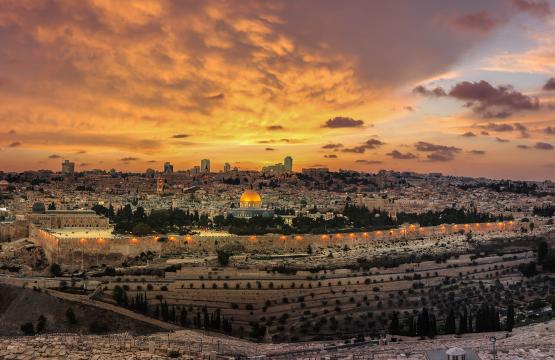
The following is an excerpt from Rabbi Jonathan Bernis’ newest book, A Lasting Peace.
Israel is Constantly on High Alert
People who live in Israel never know when an attack is going to come. They have to be ready all the time. Since 2001, more than 26,000 rockets have been fired into Israel from Palestinian territory – 26,035 of them to be exact. That works out to just a little over four rockets every day for 17 1/2 years.
Many Israelis keep wellstocked first aid kits on hand, full of essential supplies like bandages and even gas masks. They also know where the nearest bomb shelter is. Bomb shelters may be a thing of the past for most Americans – a relic from the Cold War with the Soviet Union. But many Israeli neighborhoods have them now – and use them on a regular basis.
Bear in mind that the rockets fired into Israel are not aimed at any specific targets. The Palestinians who fire them don’t care what they destroy or whom they kill. If a rocket smashes into an Israeli military base, they are delighted. But a school or a hospital would make them just as happy. Their desire is to kill Jews. Any Jew will do.
According to the Israeli government, “More than half a million Israelis have less than 60 seconds to find shelter after a rocket is launched from Gaza into Israel. Many have only 15 seconds.”
As I write these words, I am in Tiberius, Israel, where a rocket attack was just launched from Syria by Iran. My hotel shook from the blasts as Israel’s DOME system intercepted and destroyed several of the missiles. Some missiles did make it through and exploded in the Golan Heights just a few miles from here.
Fortunately, there were no casualties and no significant damage. Tensions on Israel’s border with Syria have been intensifying and will continue to do so as long as Iran is free to operate there. Of course, Israeli jets were in the air within minutes and attacked a number of Iranian military bases in response. But missile attacks are not the only threat Israel faces.
From Rockets to Knives
According to a December 2015 article in The Washington Post, near-daily Palestinian attacks against Israeli civilians and soldiers cause fear and anger in Israeli society.
The killings have continued nonstop since Israel officially became a country in 1948, and the carnage has increased as human beings have developed more efficient ways to kill one another.
Palestinians Are Victims Too
I want to make it clear that my intent is not to point a finger at the Palestinian people or try to make them sound inherently evil. They are human beings created in the image of God, as are the Jews who live in Israel.
But for many of them, every ounce of human compassion and conscience has been swept away by a river of unreasoning hatred. And so, bloodshed and war go on and on with no end in sight, despite the dozens of attempts and countless millions of dollars that have been invested in the effort to bring a lasting peace to the Middle East.
And while I do not support everything Israel does (Israelis have made plenty of mistakes over the years), I do believe that her leaders have done everything possible to live in peace with her neighbors. Israel has made dozens of concessions in response to their demands. Israel has returned land it won – not through acts of aggression, but because it was attacked and fought back.
A Lasting Peace Book, Study Guide and DVD Package (2074)
This package includes:
- A Lasting Peace
- A Lasting Peace DVD
- A Lasting Peace Study Guide
- "I Stand with Israel" JVMI Car Magnet
The Elusive Search for Peace
The history of the Middle East is filled with the remnants of many shattered peace treaties. Over the past 100 years there have been at least ten attempts to bring peace between Jews and Arabs in the Middle East.
What Does the Bible Say?
The ancient Hebrew prophets foresaw many bloody battles in the Middle East, which they described in detail. The New Testament Book of Revelation also contains a powerful description of a cataclysmic battle that takes place at the end of the age. Yeshua (Jesus) Himself said that we could expect “wars and rumors of wars” (Matthew 24:6) until His return.
Does this mean that Believers should sit on the sidelines and watch the violence continue? Are we supposed to throw up our hands and say, “Oh well, it’s all preordained, so there’s nothing we can do about it”?
I don’t see it that way, largely because of something else Yeshua said: “Blessed are the peacemakers, for they will be called children of God” (Matthew 5:9). I believe that God wants and expects His people to work for peace, even when war seems inevitable. And He wouldn’t expect us to work for peace if it were unachievable.
In other words, what we do can make a difference in Israel and the rest of the Middle East. Our actions can save lives and spare innocent children and families from unnecessary pain and suffering. We can put peace in the hearts of people whose lives have been filled with anxiety and fear.
Jews Around the World Are Suffering
As President and CEO of Jewish Voice Ministries, I often travel to Israel and other countries where Jews are waiting for a chance to move to Israel and start new lives there, which they call making Aliyah.
In Ethiopia, for example, there are thousands of desperately poor Jews called the Beta Israel. Many are suffering and dying due to a lack of basic medicines and access to health care. As a direct result, we at Jewish Voice Ministries go there to provide the treatments they desperately need. Thousands of people, many of them children, are suffering terribly.
Some of these precious people have been beaten or burned out of their homes. They have been blocked from finding decent jobs. They are despised and desperately want to start new lives in Israel.
But I have discovered that this type of treatment of Jews is not unique to Ethiopia, nor is it unique to the Beta Israel. Jews all over the world have been treated in similar ways, especially in predominantly Arab countries of the Middle East.
I have listened to them tell their stories. Jewish children have told me about attending public primary schools where they were taught that Jews were monsters who killed children and drank their blood as part of their religious rituals. Others told of how they felt at recess, when Muslim children pretended to be mowing down Jews with automatic weapons, while teachers looked on approvingly.
I could go on and on about what Jewish people have suffered at the hands of their Arab cousins. I don’t want to pretend that no Arabs have suffered at the hands of Jews. But if Arabic children are taught to hate Jews from a very early age and are taught that Jews are monsters who deserve to be killed, then what hope is there for a lasting, just peace?
In Search of Context
One of the most important ways we can work to build a lasting peace in the Middle East is to take the time to understand the history that has led to the present situation. We can stop blaming the Jews for situations that are not their fault and understand that the Jewish people have the right to defend themselves. We can learn about all of the concessions the nation of Israel has made in attempting to achieve a lasting peace with her neighbors and not expect her to continue giving, giving, giving, and getting nothing in return.
In order to know how we should respond to the conflict in the Middle East, we have to understand what is really happening there. What we do is vitally important not only for the future of the Middle East, but for the whole world.
That’s because the conflict that has its roots in the Middle East has spread around the world and is now claiming casualties in England, France, the United States, and many other countries. Recent, deadly and highly publicized attacks in these countries and many others illustrate this truth.
To Make a Difference, We Must Understand
A basic history of the Jewish people is essential to fully understanding how this came to be. For the past 4,000 years, this land at the center of the conflict has belonged to the descendants of Abraham and Isaac, and Scripture tells us it always will.
Yet tragically, for most of their history, the people of Israel have not been able to live on the Land God gave them. Instead, they have been scattered throughout the earth by a series of wars and other calamities. Yet no matter where they have gone – America, Russia, Europe, Ethiopia, or any other country – the Jewish people have always carried within their hearts a yearning for their ancestral land.
Some Jewish families have not seen the hills and valleys of Israel for hundreds of years. Yet although they have never seen it with their own eyes, they still think of this Promised Land as the home to which they long to return and build their futures.
Why is this? I believe there is only one reason: It is the fire of God burning in Jewish hearts. We Jews know that He gave us the Land and said He would call us back to it in the Last Days. This is what is supposed to be, and we cannot rest until it becomes a reality.






